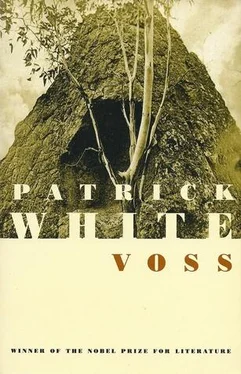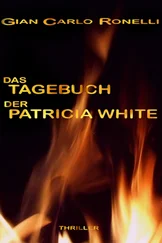‘Blackfeller no good this place,’ Dugald moaned.
Voss now returned to his tent, and fetched a gun. He called to the two natives.
‘You come, Dugald, Jackie. We go look cattle.’
But the two men were fascinated by the fire. They turned their faces from the darkness, and stared closer into the coals, rubbing their cheeks against the dust. Darkness is a place of evil, so, wisely, they avoided it.
Voss continued up the valley for what seemed like some considerable distance, encountering only a vast, dark humidity. Once a cow and calf propped, and snorted at him, and lumbered away. There was no further sign of cattle.
‘ Nutzlos ,’ he said, coldly furious, and discharged his weapon once or twice in the direction the herd must have taken.
When he returned, Le Mesurier and Palfreyman had come out, awakened by the shots and a hysteria of dogs.
‘It is probable that blacks have driven off the cattle,’ Voss announced. ‘There is nothing we can do for the present.’
Beside their fire Dugald and Jackie were listening to these words. The voice of the white man could have been issuing from the earth.
So Christmas began.
In the morning, it was learnt that more than half the cattle had been driven off. Dugald, who had resumed possession of his ancient grace and a kind of sad resourcefulness, said that Jackie would take his horse and search — Jackie had eyes for stolen cattle — and Voss accepted this suggestion as a temporary measure, if not a way out of their dilemma.
The others were secretly glad that, for the moment at least, they need not exert themselves on such a radiant, pigeon-coloured morning. After breakfast — a subdued, though contenting meal — Harry Robarts fetched out a flag they had brought with them, and fastened it to a sapling-staff, from which it hung rather dank. At once somebody began to mumble, then almost all joined in, and they were singing ‘God Save the Queen’ .
The German in his crimson shirt observed them with amusement, but quite kindly, holding himself erect by instinct, if not from approval.
Afterwards, Mr Palfreyman produced his prayer-book, and declared his intention of reading the Church of England service.
Then Voss said:
‘It may not be the wish of everyone, Palfreyman, to be forced to worship in this way. It is preferable if each man does his own part, and reads in his own book. There,’ he concluded, looking at them.
It was not altogether unreasonable, and Palfreyman made himself condemn certain of his own thoughts.
Soon, one or two who possessed prayer-books had taken them out, and were attempting to follow the words, in that place where the wild jasmine was sweetly stifling a sense of duty, and the most dogged devotions were shot through with a glint of parrots. Turner, frankly, whittled wood, and recalled how the rum was far more efficacious than prayer as a means of refreshment. Judd went away.
‘The old beggar,’ Turner was quick to call. ‘What will yer ma say? Church is not out.’
‘I have things to do,’ Judd mumbled. ‘There is the mutton.’
‘Then, I will come and lend a hand,’ Turner proposed.
But he was not encouraged by the convict, who went from there, shambling and mumbling.
‘There is no need,’ he said, surlily. ‘I have my own methods, and will be ready by noon.’
So that Ralph Angus looked up from his dry book, and his mouth was full and moist in anticipation.
Judd was soon hidden by the blessed scrub. He who could squeeze the meaning out of a line by pressing on it with his finger-nail, always hastened to remove himself from the presence of true initiates when they were at their books. All the scraps of knowledge with which he was filled, all those raw hunks of life that, for choice, or by force, he had swallowed down, were reduced by the great mystery of words to the most shameful matter. Words were not the servants of life, but life, rather, was the slave of words. So the black print of other people’s books became a swarm of victorious ants that carried off a man’s self-respect. So he wandered through the bush on that morning, and was only soothed at last by leaves and silence.
Then he was glad again. He would have expressed that gladness, but could not, except by letting the smooth leaves lie upon his stubbly face, except by being of the stillness. In this way he offered his praise. For a short space the soul returned to his body, from which it had been driven out by whips, and he stood there looking through inspired eyes into the undergrowth.
When Harry Robarts discovered Judd, the latter was already at work upon the sheep’s carcass. He was cursing the flies.
‘Urchhh!’ cried the disgusted boy.
‘Why, Harry,’ said Judd, ‘those are only maggots.’
‘And what about our dinner?’
‘Why, it will be on your plates, as promised.’
‘Maggots and all?’
‘Maggots knock off very easy,’ Judd replied.
He was, even now, engaged in knocking them off.
‘Filthy stuff!’ cried the boy.
Certainly the meat was already of rather a green appearance as the result of such a damp heat.
‘You wait and see,’ coaxed the convict. ‘You will be surprised. If you do not eat your mutton, then I will eat my hat.’
But the boy was not consoled.
‘My stomach is turned up,’ he complained.
‘Not everyone is queasy by nature,’ answered Judd. ‘Still, Harry, I will ask you not to mention this to anyone else.’
Other incidents prevented the boy from breaking his promise.
During the morning a party of blacks appeared, first as shreds of shy bark glimpsed between the trunks of the trees, but always drifting, until, finally, they halted in human form upon the outskirts of the camp.
‘Did you ever see such a filthy race?’ asked Ralph Angus, whose strength and looks prevented him from recognizing anything except in his own admirable image.
‘We do not understand them yet,’ said Le Mesurier.
The latter’s doubts and discoveries could have been leading him towards the age of wisdom.
‘You are morbid, I believe, Frank,’ Angus said, and laughed.
He was all for driving out the wretched mob of cattle thieves.
The blacks were watching. Some of the men even grew noble in the stillness of their concentration and posture of their attenuated limbs. Their faces betrayed a kind of longing. Others, though, and particularly the old, could have been wallowing beforehand in the dust; they had the dusty, grey-black skins of lizards. Several of the women present had had the hair burnt from their heads. The women were altogether hairless, for those other parts which should have been covered, had been exposed by plucking. By some perversity of innocence, however, it did seem to emphasize the modesty of those who had been plucked. They had nothing left to hide.
Turner, naturally, was provoked to immoderate laughter, and was shouting:
‘What will you bid for the molls, Mr Le Mesurier?’
And when Le Mesurier was silent:
‘Or are they not to your taste?’
Finally, he took the handle of the iron frying-pan, which he still had about him from the previous night, and presented it to one of the more impressive blacks.
‘You sell wife,’ he demanded. ‘I buy. But the pretty one. The one that has not been singed right off.’
Everyone was by this time repelled by Turner, and by the blacks that had so inspired him.
The blacks themselves were disgusted by those of his gestures which conveyed a meaning. Several of the males made hissing noises, and the pan-handle was flung down.
Hearing the scuffling and flumping that followed, and curses from Turner, and gibberish of natives, the German had come out of his tent, and entered into the situation.
Читать дальше












